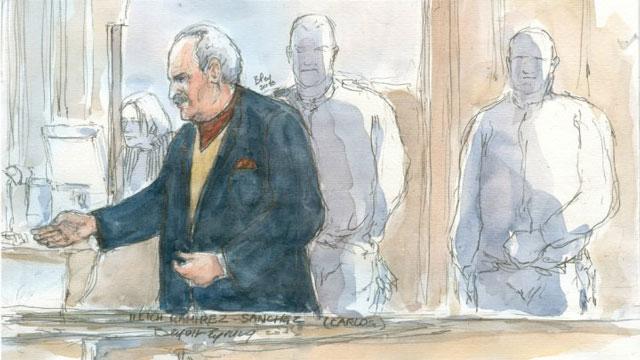
Paris, France | AFP | Carlos the Jackal, the world’s most wanted fugitive in the 1970s and early 1980s, went on trial in France on Monday for the deadly bombing of a Paris shop more than 40 years ago.
The 67-year-old convict cut a grizzled, thinner figure as he was led smiling into a courthouse in Paris, where he is serving a life sentence for other attacks.
Ever the sharp dresser with a taste for theatrics, he wore a jacket and a red pocket kerchief and kissed the hand of his lawyer Isabelle Coutant-Peyre, who is also his partner, before blowing kisses at the media.
While attention in France is now focused on the jihadist threat after a string of bloody attacks, the trial reaches back to a time when Europe was repeatedly targeted by groups sympathetic to the Palestinian cause.
Carlos, a Venezuelan whose real name is Ilyich Ramirez Sanchez, was dubbed “Carlos the Jackal” by the press when he was giving international security services the slip while on the run.
The nickname came from a fictional terrorist in the 1971 Frederick Forsyth novel, “The Day of the Jackal”, which was turned into a popular film.
Arrested in the Sudanese capital Khartoum in 1994 by French police, the man who describes himself as a “professional revolutionary” is already serving a life sentence for the murders of two policemen in the French capital in 1975 as well as that of a former comrade who betrayed him.
He was also found guilty of four bombings in Paris and Marseille in 1982 and 1983, some targeting trains, which killed a total of 11 people and injured nearly 150.
“No one in the Palestinian resistance has executed more people than I have,” Carlos said Monday.
“But I am the only one who survived. In all fights there are collateral victims, unfortunately.”
Over the next three weeks he will be tried over yet another deadly attack, this time on Drugstore Publicis, a busy shop once located in Saint-Germain-des-Pres in the heart of Paris’s Left Bank.
In the late afternoon of September 15, 1974, a grenade was lobbed into the entrance of the store, killing two men and leaving 34 people injured.
The trial is aimed primarily at shedding further light on the attack in the interests of the victims.
Carlos, who is charged with murders of a terrorist nature, denies any involvement.
– ‘Wounds never healed’ –
Georges Holleaux, a lawyer representing the two widows of the men killed and 16 other people affected by the attacks, said before the trial that his clients relished the chance of seeing Carlos face justice.
“The victims have been waiting so long for Carlos to be judged and convicted. Their wounds have never healed,” he said.
Coutant-Peyre said the trial was a waste of time and money.
“What exactly is the point of having a trial so long after the events?” she asked.
Al-Watan Al-Arabi magazine published an interview in 1979 in which Carlos is said to have admitted that he carried out the attack.
He has since denied giving the interview.
The defence has argued that the statute of limitations has expired, while also noting that judges have twice thrown out the case for lack of evidence, in 1989 and 1999.
But these arguments were overruled.
The prosecution says the attack was linked to a hostage-taking at the French embassy in The Hague that had begun two days earlier.
The case against Carlos is also based on witness testimony from his former brothers-in-arms.
Investigators have tracked the provenance of the grenade and say it came from the same batch as those used by the hostage-takers in The Hague and had been stolen from a US army base in 1972.
One was also found at the Paris home of Carlos’s mistress.
 The Independent Uganda: You get the Truth we Pay the Price
The Independent Uganda: You get the Truth we Pay the Price





